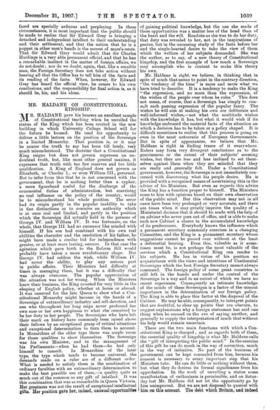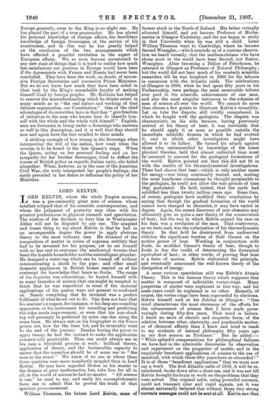MR. HALDANE ON CONSTITUTIONAL KINGSHIP.
:111 HALDANE gave his hearers an excellent sample R. of Constitutional teaching when he unveiled the statue of the King which has been erected in the new building in which University College School will for the future be housed. He used his opportunity to deliver a little lecture on the position of the Sovereign in a limited Monarchy. That position is, or it may be nearer the truth to say has been till lately, very much misunderstood. The doctrine that a Constitutional King reigns but does not govern expresses an un- doubted truth, but, like most other general maxims, it expresses that truth with too few reserves and too little qualification. A King of England does not govern as Elizabeth, or Charles I., or even William III., governed. But to infer from this that he is not concerned with the government, that he is nothing better than a cypher, a mere figurehead useful for the discharge of the ornamental duties of administration, but exercising no real influence on the policy of the country, would be to misunderstand his whole position. The error had its origin partly in the popular inability to take in fine distinctions or to conceive an authority which is at once real and limited, and partly in the position which the Sovereign did actually hold in the persons of George IV. and William IV. It was fortunate, on the whole, that George III. had no successor like minded with himself. If his son had combined with his own real abilities the character and the resolution of his father, he might have made a similar bid for independence with greater, or at least more lasting, success. In that case the agitation which gave birth to the Reform Bill would probably have taken a more revolutionary shape. But George IV. had seldom the wish, while William IV. had never the ability, to play any serious part in public affairs. Their Ministers had difficulty at times in managing them, but it was a difficulty that was always • overcome. The popular appreciation of the situation was not far wrong. When the Ministers knew their business, the King counted for very little in the shaping of English policy, whether at home or abroad. It was reserved for the late Queen to show what a Con- stitutional Monarchy might become in the hands of a Sovereign of extraordinary industry and self-devotion, and one who throughout her long reign never preferred her own ease or her own happiness to what she conceived to be her duty to her people. The Sovereigns who have left their mark on history have commonly been raised above their fellows by an exceptional grasp of critical situations and exceptional determination to turn them to account. In Monarchies of the older type there was ample room for these qualities to show themselves. The Sovereign was his own Minister, and in the management of his Parliaments—when he had them—he had only himself to consult. In Monarchies of the later type, the type which tends to become universal, the demands made on a ruler are of a different order. What is needed to satisfy them is the combination of ordinary faculties with an extraordinary determination to make the best possible use of them,—a quality quite as much out of the common as any gift of intellect. It was this combination that was so remarkable in Queen Victoria. Her greatness was not the result of exceptional intellectual gifts. Her position gave her, indeed, unusual opportunities of gaining political knowledge, but the use she made of these opportunities was a matter less of the head than of the heart and the will. Resolute as she was to do her duty, that duty was revealed to her, not in the inspirations of genius, but in the unceasing study of the facts before her and the single-hearted desire to take the view of them which the welfare of her subjects demanded. She was the author, so to say, of a new theory of Constitutional kingship, and the first example of how much a Sovereign may accomplish who is content to make this theory his own.
Mr. Haldane is right, we believe, in thinking that in spite of much that seems to point in the contrary direction, " the tendency of the time " is more and more what we have tried to describe. It is a tendency to make the King " the expression, and no more than the expression, of the wishes of the people over whom he rules." This does not mean, of course, that a Sovereign has simply to con- sult each passing expression of the popular fancy. The wishes he will aim at making his own are deliberate and well-informed wishes,—not what the multitude wishes with the knowledge it has, but what it would wish if its knowledge embraced the material facts of the situation on which a decision has to be taken or a policy shaped. It is difficult sometimes to realise that this process is going on even in the most autocratic of European Governments. But in spite of appearances, we believe that Mr. Haldane is right in finding traces of it everywhere. Rulers may form very divergent conclusions as to the genuineness or the extent of their subjects' seeming wishes, but they are less and less inclined to set them- selves against them when they are satisfied that they are really and generally felt. Under a Constitutional government, however, the Sovereign is not immediately con- cerned with discovering what his people desire. He is provided with a recognised means of ascertaining this in the advice of his Ministers. But even as regards this advice the King has a function proper to himself. The Ministers come to him with opinions based on their own observation of the public mind. But this observation may not in all cases have been very prolonged or very accurate, and there are times when it may greatly improve the quality of a Ministerial decision that it should be made with the help of an adviser who never goes out of office, and is able to make each new Cabinet a sharer in the accumulated knowledge of its predecessors. Everybody knows the influence which a permanent secretary commonly exercises in a changing Committee, and the King is a permanent secretary whose suggestions cannot be passed over without at the least a deferential hearing. Even this, valuable as it some- times must be, is not perhaps the most valuable of the services which a Constitutional King can render to his subjects. He has in virtue of his position an acquaintance with the views and intentions of Continental Sovereigns which the best Foreign Secretary cannot always command. The foreign policy of some great countries is still left in the hands and under the control of the Sovereign in a way and to an extent of which we have no recent experience. Consequently an intimate knowledge of the minds of these Sovereigns is a factor of the utmost importance in the determination of our foreign policy. The King is able to place this factor at the disposal of the Cabinet. He may be able, consequently, to interpret points that are doubtful, to clear up points that are obscure, to suggest explanations why a foreign statesman has said one thing when he seemed on the eve of saying. another, and generally to supply the interpretation of much that without his help would remain uncertain.
These are the two main functions with which a Con- stitutional King is charged ; and as regards both of them, the essential quality of kingship is what Mr. Haldane calls the " gift of interpreting the public mind." In the exercise of this gift he can do much in the way of correction, much in the way of initiative. No part of the business of government can be kept concealed from him, because his consent is necessary to every important step that his Ministers take. He can do little or nothing without them, but what they do derives its formal significance from his approbation. In the work of unveiling a statue some manifestation of enthusiasm is permissible, and on Satur- day last Mr. Haldane did not let the opportunity go by him unimproved. But we are not disposed to quarrel with him OR this amount. The debt which Britain; and indeed Europe generally, owes to the King is no slight one. He has played the part of a true peacemaker. He has placed his personal knowledge of foreign affairs, his hereditary knowledge of foreign Sovereigns, at the service of his countrymen, and in this way he has greatly helped on the conclusion of the two arrangements which have effected a peaceful revolution in the aspect of European affairs. We so soon become accustomed to any new state of things that it is bard to realise how much less satisfactory our position in Europe would have been if the Agreements with France and Russia had never been concluded. They have been the work, no doubt, of succes- sive Foreign Secretaries and successive Prime Ministers. But we do not know how much they have been aided in their task by the King's remarkable faculty of making himself liked by foreign peoples. Mr. Haldane has helped to remove the misunderstanding which he thinks exists in many minds as to " the real nature and working of that delicate organisation, our Constitution." One of the chief advantages of its unwritten laws is that they " give freedom of initiation to the man who knows how to identify him- self with the whole and the whole with himself." English. men are fortunate in living under a Sovereign who answers so well to this description, and it is well that they should now and again have the fact recalled to their minds.
A striking example of how strong is the Sovereign when interpreting the will of the nation, how weak when the reverse, is to be found in the late Queen's reign. When the Queen, acting on her personal feeling and on her sympathy for her brother Sovereigns, tried to deflect the course of British policy as regards Italian unity, she failed altogether. When, however, as in the case of the American Civil War, she truly interpreted her people's feelings, she easily prevailed in her desire to influence the policy of her Ministers.















































 Previous page
Previous page